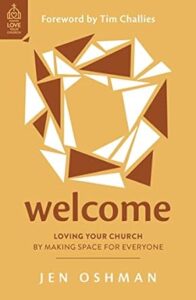So, how did you all like the book we read this month? After a brief moment of silence, one person in the small group said, “I did not like the book.” Another followed that, “I did not like it either.” I was leading the discussion, so I had to find a way to validate their concerns and facilitate a helpful conversation. We discussed the helpful and unhelpful suggestions in the book Welcome, Loving Your Church by Making Space for Everyone by Jen Oshman.

I agreed with the concerns brought up in the small group discussion. Many did not connect with the book and thought some of the arguments were personal and not compelling. Others thought it was convicting. Engaging with books we may not like is helpful, especially in a world where people do not know how to disagree on anything. I can find some good things in books that I may not agree with or connect with. In this review, I want to provide what I found helpful and areas that were not as helpful in the book. Here is what I found both commendable and challenging in the book.
Strengths
The title of this book reveals the premise that the church should be a welcoming place for all. Oshman begins by describing how Jesus welcomed us and how that should motivate us to welcome others. She used many personal examples from churches worldwide, as she was a member of a missionary family that later moved back to the United States. I appreciated the quote she used from Ray Ortlund on how his church would start their services, “To all who are weary, and need rest; to all who mourn, and long for comfort; to all who fail, and desires strength; to all who sin, and need a Savior, this church opens wide her doors with a welcome from Jesus himself, the Friend of sinners.” I also liked her point that “Christians suffer in isolation because we were not meant to be alone. We were created for community.” Toward the end of the book, she provides some helpful suggestions on how to connect with more people.
Shortcomings
I found shortcomings in some of the points she was trying to make, primarily with her convictions. Convictions are important, and the Lord uses those for the good, but we have to be careful that we do not place our convictions as a rule for all believers. One example is this, “Do we view our church gatherings as a place to receive or as a place to give?” That quote is a false dichotomy that occurs when one is convicted on either extreme. I believe the Bible would suggest both, not one or the other. We come to church to receive spiritual nourishment for our souls, and out of the outflow, we serve others. Another example is when she visited a church with restrooms in lousy shape but welcoming people throughout the church. She had the conviction that seeing a church with a vibrant community and an imperfect building gave her hope that the congregation was a place that would make space for her family.
Oshman also used a lot of personal experience, which can be good but unhelpful when it becomes a principle for others. For example, she had narrowed the definition of the local church primarily to proximity and relationships. She said, “To be a member of a local church, then, is to commit to a local group of people.” In addition, “Church life is a daily, local, and close-both geographically and relationally.” She used examples of the New Testament church for this argument. The problem is when you use descriptive passages as prescriptions for all believers. With this argumentation, we should meet in homes (like the New Testament) rather than church buildings. Also, many people do not have a local church geographically, but it is still considered their local church, and there are deep relationships in that community.
Conclusion
Overall, the book made some good points, but I needed to connect with the author. I agree with the overall premise of welcoming others, but the arguments presented were not compelling. I may disagree with the author on many points, but that disagreement does not make me think any less of the author. She seemed to have a heart for the Lord, wanting the church to be a community that welcomes all, as Jesus has welcomed us.